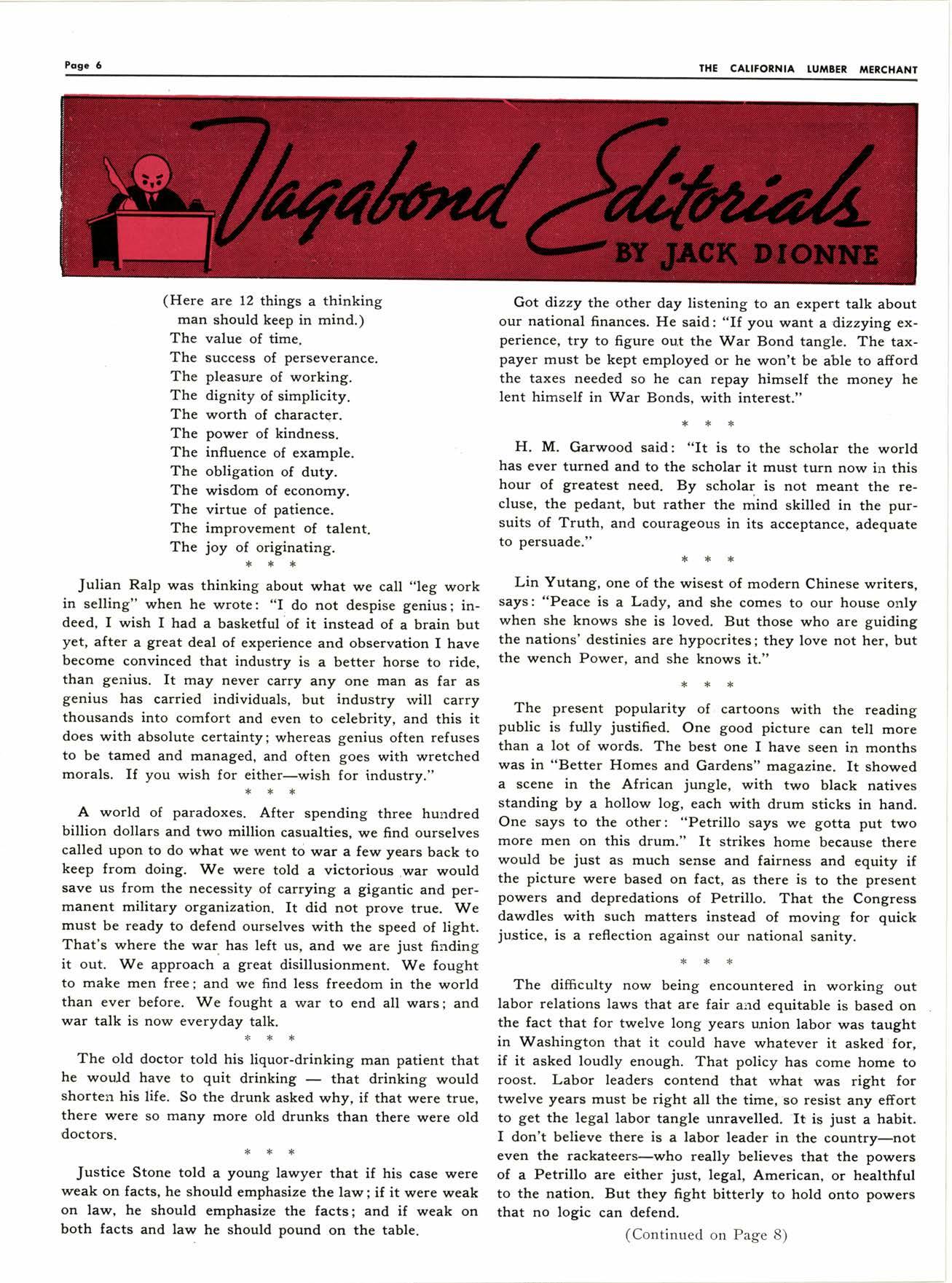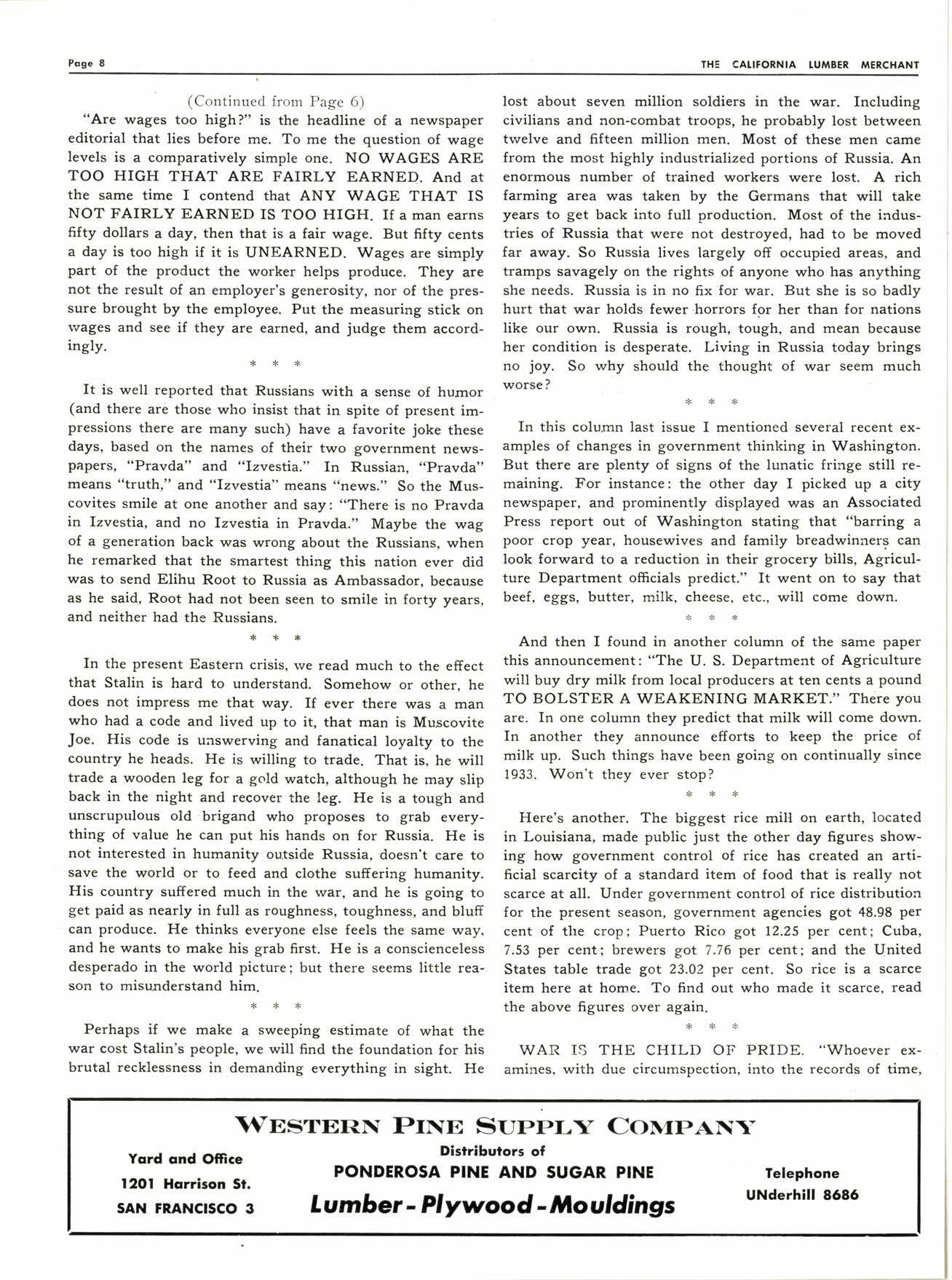
8 minute read
Plywood'
The value of time,
The success of perseverance.
The pleasure of working.
The dignity of simplicity.
The worth of charactqr.
The power of kindness.
The influence of example.
The obligation of duty.
The wisdom of economy.
The virtue of patience.
The improvement of talent.
The joy of originating.
Julian Ralp was ttrinr.ii lool. -n". we cau "teg work in selling" when he wrote: "I do not despise genius; indeed, f wish I had a basketful'of it instead of a brain but yet, after a great deal of experience and observation I have become convinced that industry is a better horse to ride, than genius. It may never carry any one man as far as genius has carried individuals, but industry will carry thousands into comfort and even to celebrity, and this it does with absolute certainty; whereas genius often refuses to be tamed and managed, and often goes with wretched morals. If you wish for either-wish for industry."
A world of paradox.r.- ;,.: spending three hundred billion dollars and two million casualties. we find ourselves called upon to do what we went td war a few years back to keep from doing. We were told a victorious,war would save us from the necessity of carrying a gigantic and permanent military organization. It did not prove true. We must be ready to defend ourselves with the speed of light. That's where the war. has left us, and we are just finding it out. We approach a great disillusionment. We fought to make men free; and we find less freedom in the world than ever before. We fought a war to end all wars; and war talk is now everyday talk.
The old doctor tora ni".iiql,orlu.rrro,rr* man patient that he would have to quit drinkingthat drinking would shorten his life. So the drunk asked why, if that were true, there were so many more old drunks than there were old doctors.
Justice Stone told " ,r;* UL,y", that if his case were weak on facts, he should emphasize the law; if it were weak on law, he should emphasize the facts; and if weak on both facts and law he should pound on the table.
Got dizzy the other day listening to an expert tdk about our national finances. He said: "If you want a dizzying experience, try to figure out the War Bond tangle. The taxpayer must be kept employed or he won't be able to afford the taxes needed so he can repay himself the money he lent himself in War Bonds. with interest."
**{<
H. M. Garwood said: "It is to the scholar the world has ever turned and to the scholar it must turn now in this hour of greatest need. By scholar is not meant the recluse, the pedant, but rather the mind skilled in the pursuits of Truth, and courageous in its acceptance, adequate to persuade."
Lin Yutang, one of ,n. *i".ra l, ,rroa.r., Chinese writers, says: "Peace is a Lady, and she comes to our house only when she knows she is loved. But those who are guiding the nations'destinies are hypocrites; they love not her, but the wench Power, and she knows it."
The present popularit; J ":r.rons with the reading public is fully justified. One good picture can tell more than a lot of words. The best one I have seen in months was in "Better Homes and Gardens" magazine. It showed a scene in the African jungle, with two black natives standing by a hollow log, each with drum sticks in hand. One says to the other: "Petrillo says we gotta put two more men on this drum." It strikes home because there would be just as much sense and fairness and equity if the picture were based on fact, as there is to the present powers and depredations of Petrillo. That the Congress dawdles with such matters instead of moving for quick justice, is a reflection against our national sanity.
The difficulty now O.;* ."""untered in working out labor relations laws that are fair aird equitable is based on the fact that for twelve long years union labor was taught in Washington that it could have whatever it asked,for, if it asked loudly enough. That policy has come home to roost. Labor leaders contend that what was right for twelve years rnust be right all the time, so resist any effort to get the legal labor tangle unravelled. It is just a habit. I don't believe there is a labor leader in the country-not even the lask3fssls-\ rho really believes that the powers of a Petrillo are either just, legal, American, or healthful to the nation. But they fight bitterly to hold onto powers that no logic can defend.
(Continued on Page 8)

(Continued from Page 6)
"Are wages too high?" is the headline of a newspaper editorial that lies before me. To me the question of wage levels is a comparatively simple one. NO WAGES ARE TOO HIGH THAT ARE FAIRLY EARNED. And at the same time I contend that ANY WAGE THAT IS NOT FAIRLY EARNED IS TOO HIGH. If a man earns fifty dollars a day, then that is a fair wage. But fifty cents a day is too high if it is UNEARNED. Wages are simply part of the product the worker helps produce. They are not the result of an employer's generosity, nor of the pressure brought by the employee. Put the measuring stick on lvages and see if they are earned, and judge them accordingly.
It is well reported an", **rr*s with a sense of hurnor (and there are those who insist that in spite of present impressions there are many such) have a favorite joke these days, based on the names of their two government newspapers, "Pravda" and "Izvestia." In Russian, ,,Pravda" means "truth," and "Izvestia" means "ne.ws." So the Muscovites smile at one another and say: "There is no Pravda in fzvestia, and no Izvestia in Pravda." Maybe the wag of a generation back was wrong about the Russians, when he remarked that the smartest thing this nation ever did was to send Elihu Root to Russia as Ambassador. because as he said, Root had not been seen to smile in forty years, and neither had the Russians.
In the present Eastern "rr*r, -. read much to the effect that Stalin is hard to understand. Somehow or other, he does not impress me that way. If ever there was a man who had a code and lived up to it, that man is Muscovite Joe. His code is uaswerving and fanatical loyalty to the country he heads. He is willing to trade. That is, he will trade a wooden leg for a gold watch, although he may slip back in the night and recover the leg. He is a tough and unscrupulous old brigand who proposes to grab everything of value he can put his hands on for Russia. He is not interested in humanity ou,tside Russia, doesn't care to save the world or to feed and clothe suffering humanity. His country suffered much in the war, and he is going to get paid as nearly in full as roughness, toughness, and bluff can produce. He thinks everyone else feels the same way, and he wants to make his grab first. He is a conscienceless desperado in the world picture; but there seems little reason to misunderstand him.
Perhaps if we make "-r;.;", estimate of what the war cost Stalin's people, we will find the foundation for his brutal recklessness in demanding everything in sight. He lost about seven million soldiers in the war. Including civilians and non-combat troops, he probably lost between twelve and fifteen million men. Most of these men came from the most highly industrialized portions of Russia. An enormous number of trained workers were lost. A rich farming area was taken by the Germans that will take years to get back into full production. Most of the iadustries of Russia that were not destroyed, had to be moved far away. So Russia lives largely off occupied areas, and tramps savagely on the rights of anyone who has anything she needs. Russia is in no fix'for war. But she is so badly hurt that war holds fewer .horrors for her than for nations like our own. Russia is rough, tough, and mean because her condition is desperate. Living in Russia today brings no joy. So why should the thought of war seem much worse ? wAR IS THE
In this colurnn t"ra ir",L r--J",r.""u several recent examples of changes in government thinking in Washington. But there are plenty of signs of the lunatic fringe still remaining. For instance: the other day I picked up a city newspaper, and prominently displayed was an Associated Press report out of Washington stating that "barring a poor crop year, housewives and family breadwinners can look forward to a reduction in their grocery bills, Agriculture Department officials predict." It went on to say that beef, eggs, butter, milk, cheese, etc., will come down.
And then I found ," "rlan.r lorr*r, of the same paper this announcement: "The U. S. Department of Agriculture will buy dry milk from local producers at ten cents a pound TO BOLSTER A WEAKENING MARKET." There you are. In one column they predict that milk will come dorvn. In another they announce efforts to keep the price of milk up. Such things have been going on continually since 1933. Won't they ever stop?

Here's another. Th. b;g:t li". ,rritt on earth, located in Louisiana, made public just the other day figures showing how government control of rice has created an artificial scarcity of a standard item of food that is really not scarce at all. Under government control of rice distribution for the present season, government agencies got 48.98 per cent of the crop; Puerto Rico got 12.25 pet cent; Cuba, 7.53 per cent; brewers got 7.76 per cent; and the United States table trade got 23.02 per cent. So rice is a scarce item here at hom.e. To find out who made it scarce. read the above figures over again.
"*rot. "whoever examines, with due circumspection, into the records of time, will find it remarked that war is the child of pride, and pride the daughter of riches-the former of which assertions may be goon granted, but one cannot so easily subscribe to the latter; for pride is nearly related to beggary and want, either by father or mother, and sometimes by both; and to speak naturally, it seldom happens among men to fall out when all have enough; invasions usually traveling from North to South, that is to say, from poverty to plenty. The most ancient and natural grounds for quarrels are lust and avarice; which, though we may allow to be brethren, or collateral branches of pride, are certainly the issues ef q.rapf."-Jonathan Swift. ,< :F
As I drive through the country in the spring of the year, I take refuge in the words of that master craftsman of words, Col. R. G. Ingersoll, when he said: "The country is my idea of HOME. There you see the rising and the setting sun; you become acquainted with the stars and clouds. The constellations are your friends. You hear the rain on the roof and listen to the rhythmic sighing of the winds. You are thrilled by the resurrection called Spring; touched ahd saddened by Autu.rnn-the grace and poetry of Death. Every field is a picture; every landscape is a poem; every flower is a tender thought; and every forest a fairyland. In the country you can preserve your identity -your personality; you keep your cheek close to the breast of nature. You are calmed and ennobled by the space, the amplitude, and the scope of earth and sky; by the sanctity of the stars,"










